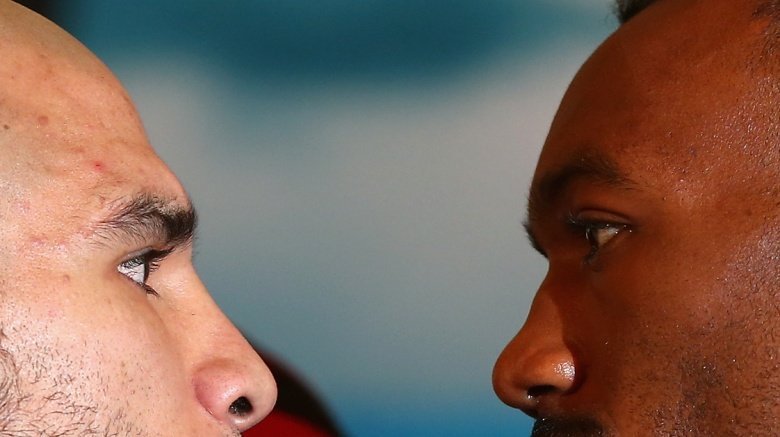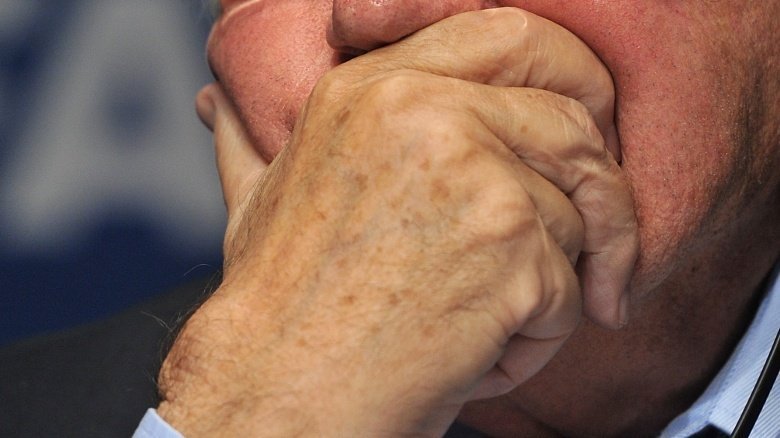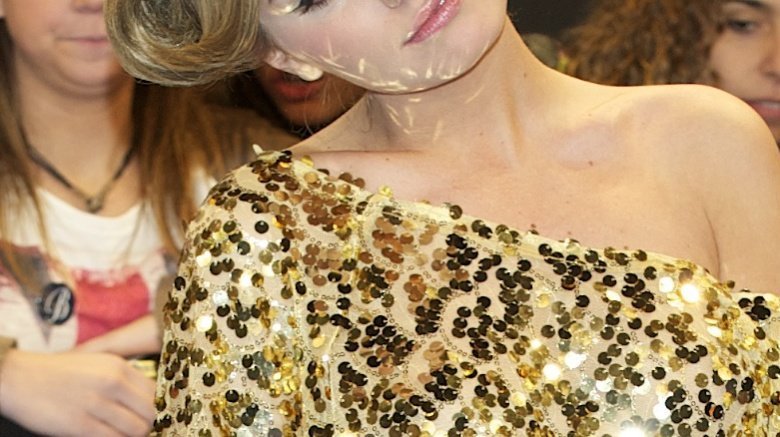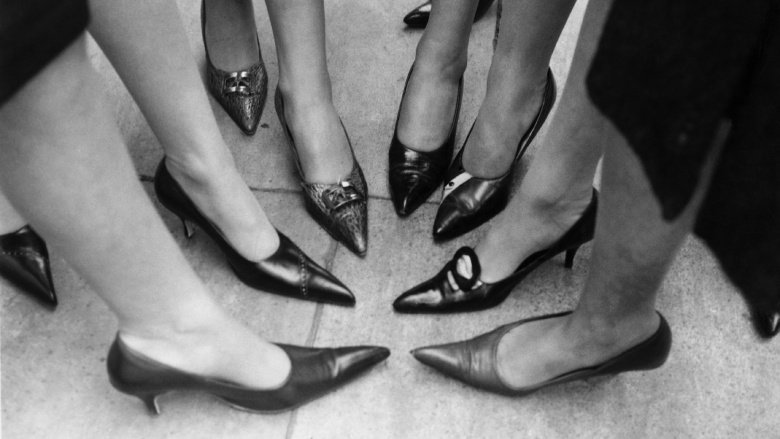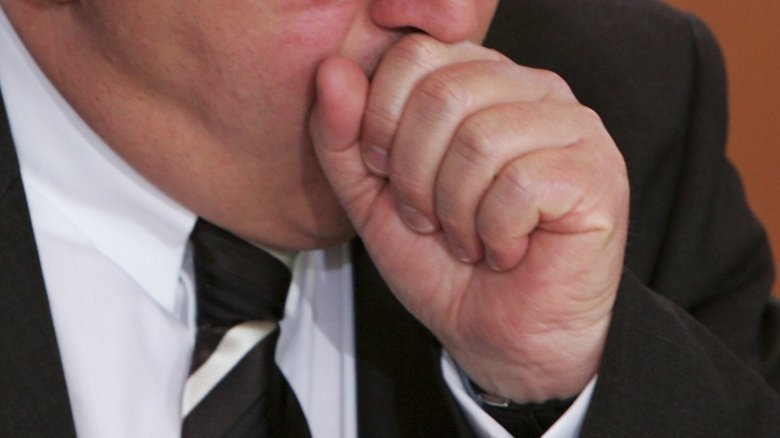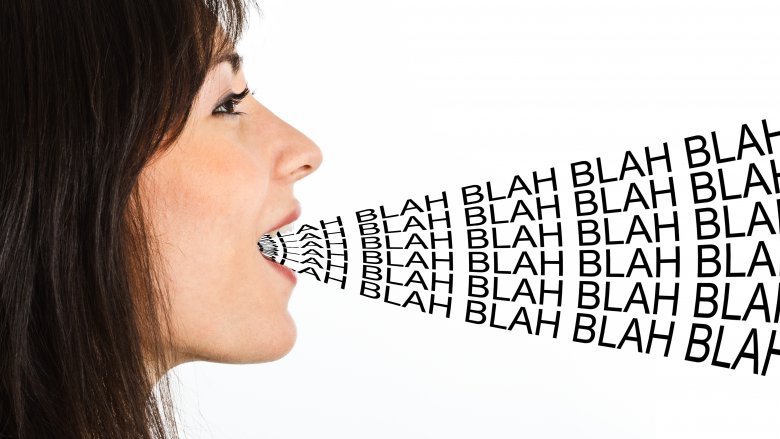Surprising Ways You Can Tell If Someone Is Lying
We all hate getting lied to. Most of us wish we knew a way to tell when someone is giving us a huge pile of BS. Well, wish no more. There are actually many ways to tell if someone is lying or not, and here are some of the best indicators. In other words, get ready to never trust another human being again. Seriously.
Uncomfortable staring
One huge clue that someone may be feeding you a line is if they stare at you intensely. Now remember, that's intensely, not intently. According to behavioral analyst Dr. Lillian Glass and her book, The Body Language of Liars, what usually happens with liars is they break eye contact. However, true sociopaths do their best to avoid that. This special breed of liar feels that maintaining eye contact is a way to "control and manipulate" others. A good example of this is infamous Ponzi schemer Bernie Madoff, who stared at his victims for a long time while he was ripping them off. (And on that, his intense eye contact was probably the worst part of losing all that money.) It could be argued that this staring is almost a form of hypnosis. The best way to combat it: fingers to the eyes. Don't feel bad about it. They're liars. They deserve it.
Where they look
Amazingly, in addition to that uncomfortable staring, the direction somebody looks when being asked a question might tell you if they're lying or not. It's why we so value people who can look you in the eye when telling you what we presume to be the truth.
According to FBI agent Mark Bouton (via Business Insider), there are several tells based around where someone looks around when answering your questions. If they're right-handed (as about 90 percent of people are), they're likely to look right when lying, and left when they're not. Boulton believes it's because the right side of your brain controls imagination, and they're using that side to concoct a story. They will shifty-eye to the right, as well, when lying about something they heard, as if they're trying to keep a secret from the rest of the world. And if they're lying about smells or sensations, they're likely going to look down and to the right. In short, if they're looking right, something ain't ... right (we're not poets).
As for the 10 percent of lefties? Boulton says they look, shift, and dart to the left when lying. So find out what hand dominates before you get to interrogating.
Hiding their mouth and/or face
For some reason, when people lie, they tend to cover their pie holes. This is strange because, in a sense, they're drawing attention to the very place from which lies are pouring forth. But that's what they do. According to Glass, when adults cover their mouths, it means they're not "revealing everything" and are literally "closing off communication." Or, in other words, they're trying to hide something by hiding their mouths. So when you're talking with someone and you see their hand going to their mouth, just cut to the chase and ask them if they're fibbing. (And in the case of kids, just assume they're lying to you always, mouth covered or not.)
Freaky head movements
If a person's eyes or mouths are too small to bother with, don't worry. A person's entire melon can be used to sniff out his or her lies. When a person shakes his or her head yes or no at the same time as when he or she speaks, you can pretty much rely on what that person says. However, if the shake comes after, you might just have found yourself a liar. An even bigger tell—liars will sometimes say yes but shake their heads no, and vice versa. So keep an eye out for those cabeza gyrations, lest you get taken for a fool.
Look at their feet
If all that isn't enough, you might want to take a gander at a person's tootsies to tell if he or she is telling a lie. According to the folks at Psychology Today, liars tend to point their feet towards the door or closest available exit, when in the midst of spinning a yarn. This signifies a physical and psychological eagerness to make a hasty escape, which is triggered by them lying to your face. So either they'd rather run away than tell you a lie—which is silly, considering they're already lying—or they're getting ready to split before they get called out on their deceit. This tell can be easily dealt with by nailing that person's feet to the floor. They deserve no less.
A lot of phlegm
When in conversation with another person, you may also want to keep an ear out for what they have to say. Or in this case, you may want to pay attention to what sounds they make and when they make them. According to former CIA agents Philip Houston, Michael Floyd, and Susan Carnicero (people who deal with a lot of liars and, it could be said, also lie for a living), liars clear their throats before they spout out a big whopper. This happens for a couple of reasons. One, it's a nonverbal way of saying, "I swear to God ..." Two, they feel a need to lie, which causes a physiological reaction in them, like anxiety or mouth and throat dryness. Though it could also mean the person is choking, so check before you go accusing them of anything.
TMI (too much information)
Ever ask someone a question and they give you way more info than you asked for? It's because they're not giving you the full truth. In a way, they're hoping to wear you down by yammering on and on about everything except the answer to your question, with no end in sight. According to Glass, it's because liars hope "with all their talking and seeming openness, others will believe them." In other words, by giving you everything except an actual answer, liars hope you'll forget the question you asked in the first place. So the next time you ask your significant other what he or she did while out with his or her friends, and they only tell you all about what their friends did, you might have cause for concern.
Pauses and delays in responding
It isn't just how much they say, it's how quickly they say it. For the most part, if somebody's telling the truth, they're going to tell it quickly and without hesitation. If they're hiding something, however, they may take longer to spill a lie, since they're working overtime to craft the thing.
According to Houston, Floyd, and Carnicero, the ex-CIA agents who wrote a catch-liars book called Spy The Lie (via Parade), if you ask someone a question, and they pause before responding, you might not want to trust what they say. Of course, this hinges a lot on what kind of question you ask the person.
If you ask them, "What did you have for breakfast on September 14, 2009?" you're not likely to get a quick answer unless it's "How the hell should I know? Go away." But if you ask them, "Did you stab a man on September 14, 2009?" and they didn't, they'll likely answer "no" super-fast. If they don't, and they take a little time to answer, then perhaps you've caught them in a lie, and maybe you've got an investigation to launch.
They can't answer the same question multiple times over
Some people are pretty good at lying. Amazingly, if they're so good they can keep lying over and over again, it actually becomes easier to spot them as the big fibbers they are.
Ex-Green Beret Sergeant Major Karl Erickson, during an interview with Entrepreneur, mentioned a bunch of methods he and other military types use to weed out liars. One of the more interesting ways is to ask the same question three times, in three different ways. But this method isn't done for the reasons you might think. While some do this to see if their subject starts changing their answer after each question, Erickson prefers to focus on people who don't change. As in, no matter how often you ask the question, no matter how you vary the question's wording, you get the same rote, rehearsed-sounding answer, that's almost word-for-word the same response you just got, watch out. You might be dealing with someone who's concealing a lot from you, and who thinks following a script will let them get away scot-free.
If they give the same answer but it sounds more natural, and less scripted, and there's variation in how they tell you their side of the story, then probably they're for real. It's when they start to sound like a politician that you can trust them like you would a politician. Namely, not at all.
They become obsessed with how they look
For some reason, when people are lying, they become obsessed with how they look. According to former Agent Houston and company, grooming oneself is a way to deal with the anxiety of lying. Liars adjust ties or shirt collars, brush their hair behind their ears or straighten their skirts (depending on whether a man or woman is doing the lying). And if sweat is involved, forget about it. It should be noted that sweat itself doesn't mean a person is spreading disinformation. However, if that person wipes the sweat away with a handkerchief or—worse yet—their hand, you might have a full-blown liar on your hands. Or at the very least, a full-blown stinkaroonie.
Standing still
It's generally accepted that if somebody starts shifting around, or they come down with a bad case of happy feet, they're not on the up and up. But it turns out the opposite may be true too — if they're too still, or too stiff, grab the fire extinguisher because their pants just caught ablaze.
As Glass explains (via Business Insider), people who stand normally are probably okay, but when they start getting rigid and super-stiff, that's a sign they're hiding something. She believes it's part of the body's natural "fight or flight" response, and going stiff is the body preparing for a fight, something it wouldn't need to do if there was nothing to hide. In a way, standing super-still is overcompensating for trying not to fidget too much. Her advice: "if you observe a rigid, catatonic stance devoid of movement, it is often a huge warning sign that something is off." Exceptions to this rule: boot camp recruits, Buckingham Palace guards, people with tetanus.

